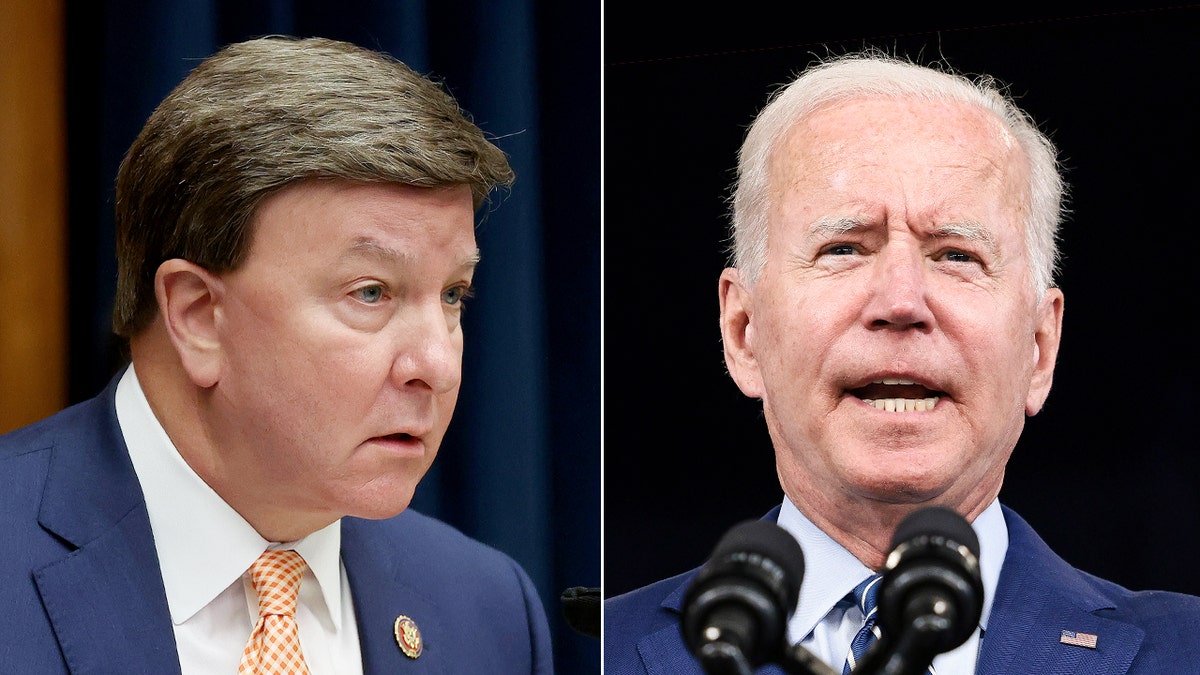EXCLUSIVE: Republicans on the House Armed Services Committee are urging President Biden to increase the national defense budget for 2023, warning that the country "cannot afford to shortchange" national security amid "unprecedented threats" facing the United States.
President Biden, last week, rolled out his $5.8 trillion budget proposal for fiscal year 2023, and touted his defense proposal as "one of the largest investments in our national security in history."
But all 28 Republicans on the House Armed Services Committee, led by the ranking member, Rep. Mike Rogers, R-Ala., are calling for an increased budget to ensure "sufficient defense topline."

Rep. Mike Rogers and President Joe Biden (Chip Somodevilla/Getty Images/Bloomberg | Anna Moneymaker/Getty Images)
"Our nation faces unprecedented threats from China and Russia and it’s unconscionable that President Biden has chosen to once again shortchange our warfighters," Rogers told Fox News Monday. "By failing to account for inflation, President Biden’s budget request would leave America weakened and vulnerable."
With regard to China, Rogers said, "Xi Jinping is watching as President Biden continues to falter."
"In fact, while China has the largest navy in the world and is rapidly expanding their nuclear arsenal – President Biden’s budget request would decommission 24 U.S. Navy ships and cut funding for our own nuclear capabilities," Rogers said.
He added: "Luckily, Congress calls the shots when it comes to funding our military."
Rogers touted his GOP colleagues, saying he is "glad" that "all Republicans on the House Armed Services Committee are dedicated to fighting for a higher defense topline in the FY23 NDAA that accounts for inflation and ensures our warfighters have what they need to succeed in combat."
WHITE HOUSE INSISTS US TROOPS NOT GOING TO UKRAINE AFTER BIDEN COMMENTS IN POLAND
House Republican Caucus Chair Rep. Elise Stefanik, R-N.Y., who also sits on the committee, said the president’s budget "once again cuts the size of our military in the heart of a national security crisis."
"Our servicemen and women deserve better from their commander in chief. Cutting our military and defense spending signals weakness to our foreign adversaries and further threatens our national security," Stefanik said.
And Rep. Mo Brooks, R-Ala., warned that Biden’s proposed defense budget is "at least a 4% cut in real dollar spending power," after adjusting "for the ‘official’ 8% inflation rate."
"Hence, Biden’s proposed defense cuts encourage America’s geopolitical foes to engage in nefarious military attacks around the world, thereby risking war," Brooks said. "Biden’s poorly thought out real dollar defense spending cuts must be stopped."
The unified calls from Republicans on the House Armed Services Committee come after Rogers and Sen. Jim Inhofe, R-Okla., the ranking member of the Senate Armed Services Committee, led a number of their Republican members in urging Biden to increase the defense budget by 5% over the rate of inflation.
The calls also come ahead of testimony this week from Defense Secretary Lloyd Austin and Chairman of the Joint Chiefs of Staff Gen. Mark Milley before the House Armed Services Committee.

Defense Secretary Lloyd Austin, left, and Chairman of the Joint Chiefs Chairman Gen. Mark Milley talk before a Senate Appropriations Committee hearing on Capitol Hill on June 17, 2021. (Evelyn Hockstein/Pool via AP)
And the discontent with the proposal is not only from Republican lawmakers. Democratic Rep. Elaine Luria, of Virginia, last week, tweeted: "I have delayed putting out a statement about the Defense Budget because frankly it would have been mostly full of words you might expect from a Sailor, but here goes: It sucks."
Biden’s 2023 budget, rolled out last week, proposed $773 billion for the Department of Defense.
"I’m calling for one of the largest investments in our national security in history, with the funds needed to ensure that our military remains the best-prepared, best-trained, best-equipped military in the world," the president said last week, adding that it "sends a clear message that we value fiscal responsibility, safety and security at home and around the world."
Meanwhile, Biden, in his budget, called for "continued investment to forcefully respond" to Russian President Vladimir Putin’s "aggression against Ukraine, with U.S. support for Ukraine’s economic, humanitarian and security needs."
The president’s budget proposal includes $6.9 billion for the European Deterrence Initiative, NATO, and countering Russian aggression to support Ukraine and other partnerships with NATO allies.
The budget would help to "enhance the capabilities and readiness of U.S. forces, NATO allies, and regional partners" amid Russia’s now two-month-long war on Ukraine.
RUSSIA INVADES UKRAINE: LIVE UPDATES
The budget also includes $1.8 billion for the State Department and USAID, and $400 million for "Countering the People’s Republic of China Malign Influence Fund."
The budget offers $1 billion in assistance to Ukraine for the State Department, USAID and the Department of Defense to counter "Russian malign influence" and to meet emerging needs related to "security, energy, cyber security issues, disinformation, macroeconomic stabilization and civil society resilience."

Russian President Vladimir Putin speaks during a news conference in Geneva, Switzerland, on June 16, 2021. ((AP Photo/Alexander Zemlianichenko, Pool))
The Biden administration, last month, sent nearly $1 billion in military and humanitarian aid to Ukraine amid Russia’s war on the country.
Meanwhile, the budget, according to the White House, "prioritizes China as the Department’s pacing challenge," and is expected to use the proposed funds to strengthen deterrence in the Indo-Pacific region.
"DOD is building the concepts, capabilities and posture necessary to meet these challenges, working in concert with the interagency and our allies and partners to ensure our deterrence is integrated across domains, theaters and the spectrum of conflict," the White House said.
The president, last month, warned China of "consequences" should Beijing respond and agree to Russia’s requests for military and economic aid amid its more than two-month-long war on Ukraine. The White House has said officials remain "deeply concerned" about China and Russia’s "alignment."






